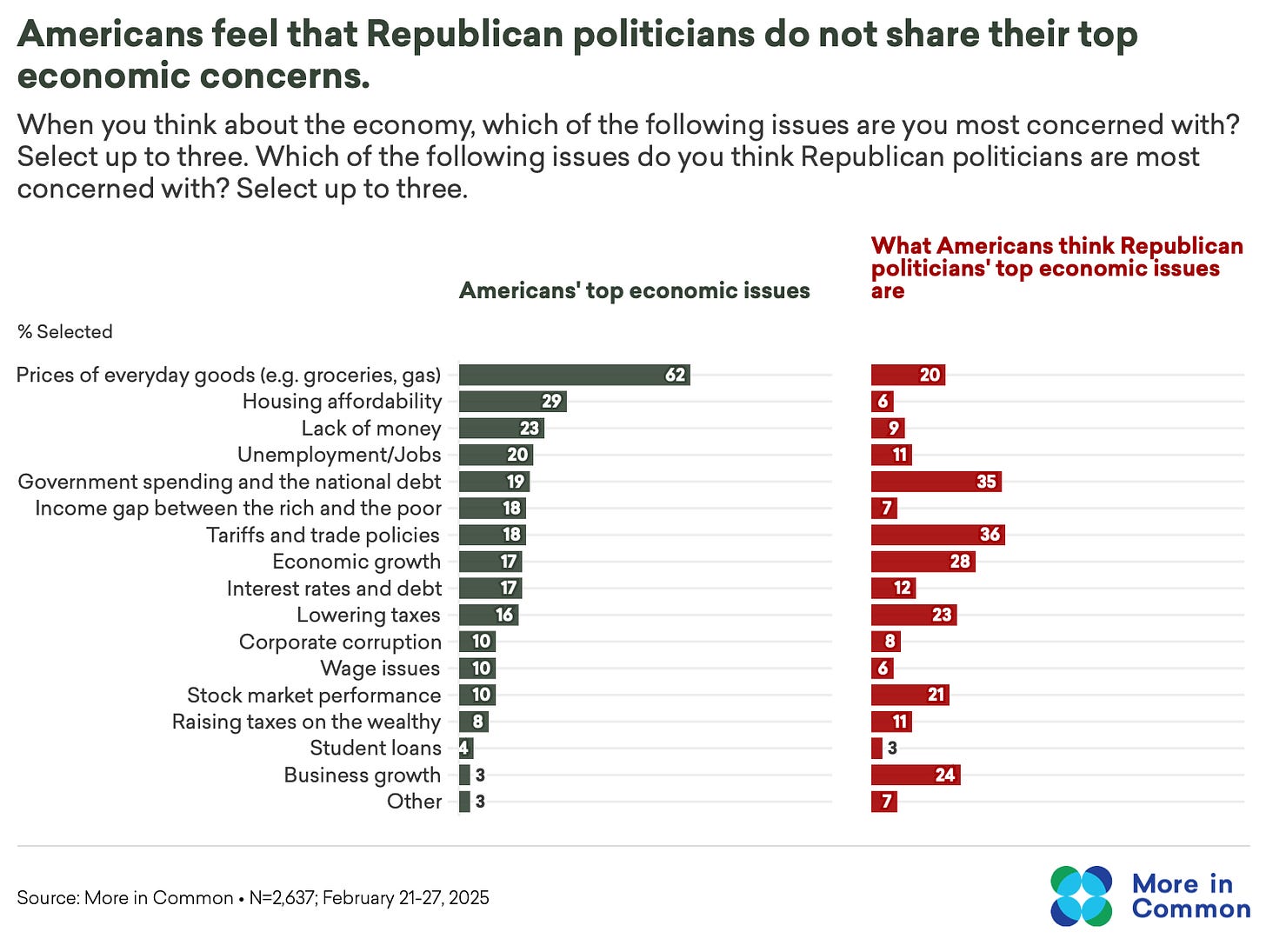Americans Are Worried About the Economy—But Don’t Think Politicians Share Their Concerns
Summary: MIC’s latest poll shows Americans are worried about the economy: cost of living remains the top concern for voters across party lines. But most don’t believe their leaders share their concerns.
Over the past fifty years, Americans’ trust in politicians – and government – has dramatically decreased. Today, less than a quarter of Americans believe politicians and leaders “care about people like me.” And many Americans feel like they are not being heard by their elected representatives.
Voting in elections is one way that Americans can express their views – and one of the clear takeaways from our post 2024 election polling was voters cared about the economy. Americans of all racial backgrounds, generations, geographic regions, classes, and political parties said their top issue in the 2024 election was inflation.
Three months into the Trump Administration, prices of everyday goods and the general state of the economy remain at the forefront. Last Tuesday, President Trump declared “Liberation Day,” implementing sweeping tariffs.
Just within the last 24 hours, the administration added and then paused new tariffs on 184 US trading partners. Those in favor argue that tariffs will be critical to bring back manufacturing jobs and re-industrialize America, or can simply serve as a bargaining tool. Those against argue that tariffs will lead the country into a recession, crippling economic growth.
What do Americans think about these policies? Do tariffs address their economic concerns, or exacerbate them? Recently, More in Common surveyed over 2,500 Americans to understand their views on tariffs, top economic concerns, and alignment with our elected leaders. Here’s what we found.
Americans are more likely to think tariffs cause more harm than good.
Our survey found nearly half of Americans (44 percent), think tariffs bring more harm than benefits to the U.S. economy. That includes a majority (68 percent) of Democrats and a plurality (47 percent) of Independents. Just 21 percent of Americans say tariffs will do more good than harm.
Republicans are more divided on tariffs: A plurality (43 percent) thinks tariffs bring more benefits than harm, whereas almost 3 in 10 believe tariffs will be equally harmful and beneficial to the U.S. economy (27 percent).
Americans’ top economic concern is the cost of living.
Americans’ economic concerns have remained consistent since the election. The price of everyday goods is still the top issue for 62 percent of Americans, followed by housing affordability and lack of money. These top three concerns reflect Americans’ struggle to afford daily life.
By comparison, only 18 percent of Americans say that tariffs are a top economic issue for them. But that doesn’t mean tariffs are off their radar – many Americans care about their impact, particularly on the cost of living.
When we asked our Americans in Conversation panel about their thoughts on the administration’s tariff policies, Americans across parties expected rising prices.
“I would support this but every single item in my house is made from another country. I do think it will affect people like me who have been struggling the last few years just to feed my family. We cannot afford groceries as it is.”
Thomas, 55-year-old white man, Traditional Conservative, Democrat from Harlan, Kentucky
“The fact is anyone who has a portfolio/401K/IRA has been hit hard. There is no way prices will not go up for consumers, and relationships are already strained.”
Dee, 61-year-old white woman, Traditional Conservative, Independent from Tampa, Florida
“It may temporarily increase the cost of buying imported goods, but in the long run, will work and or more people will buy more local goods, which would be a good thing, also.”
Todd, 43-year-old Black man, Disengaged, Republican from New York, New York
A Mismatch Between Americans’ Priorities and Political Agendas
A majority of Americans (62 percent) agree that “when it comes to economic issues, politicians from both parties are more focused on their own interests than of people like me.” Notably, this majority holds across Democrats, Independents, and Republicans.
Given that Republicans control both Congress and the White House, we also wanted to know if Americans feel their priorities align with current Republican leaders. We asked Americans both what their top economic issues were and then what they thought Republican politicians’ top economic issues were.
As mentioned earlier, 62 percent of Americans say price of everyday goods is their top economic issue. Yet only 20 percent of Americans say that the price of everyday goods is a top issue for Republican politicians.
Notably, this gap also exists among Republicans. While 65 percent of Republicans say their top issue is the price of everyday goods, only 37 percent think that is a top issue for Republicans politicians. Simply put, both Americans broadly and Republicans do not think Republican politicians care about the same issues that they do.
And when it comes to tariffs? More Americans believe tariffs are the top issue for Republican politicians than any other economic issue, whereas it ranks 7th among Americans.
If politicians are interested in rebuilding trust, they must do a better job at showing they share Americans’ priorities—and not just those of their most vocal supportive bases. Long-term national success depends both on policies that reflect and respond to the needs of the broader public and a public that trusts their elected leaders are working in their interests.
Over the last two years, we surveyed 6,000 Americans to learn about when and why they want to connect with others, especially those who are different from them. Our #ConnectionOpportunity report is now out! To learn more about this research, sign up for our upcoming webinar with the Council on Foundations (April 23rd at 2pm EST).
We can’t do this without you!
MIC regularly conducts research that sheds light on both cross-group misperceptions and common ground. Consider supporting our work by making a donation.






